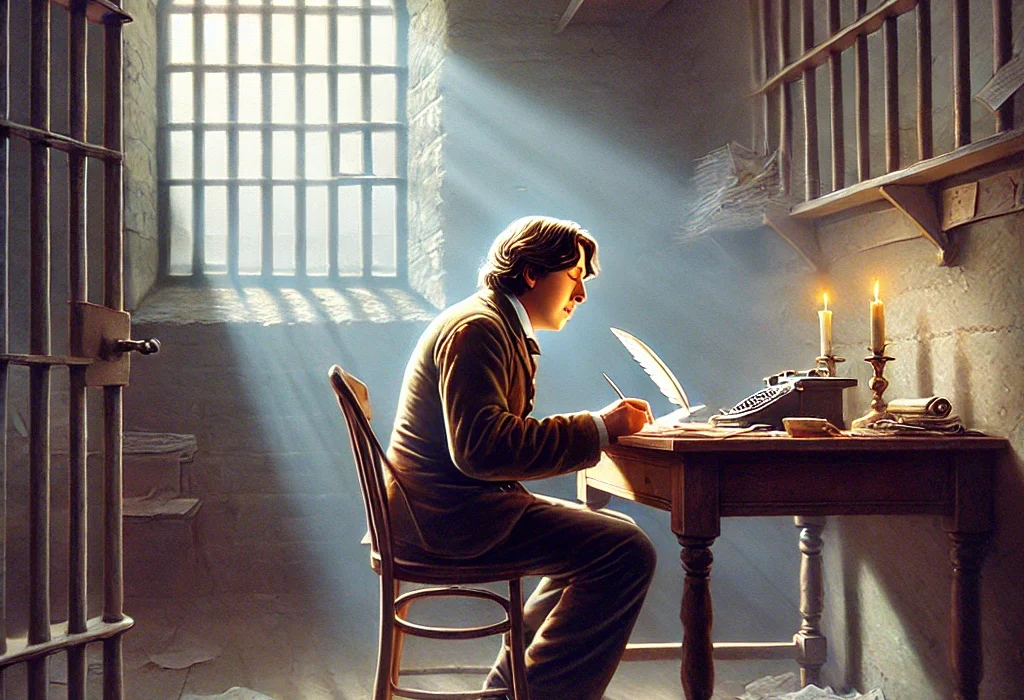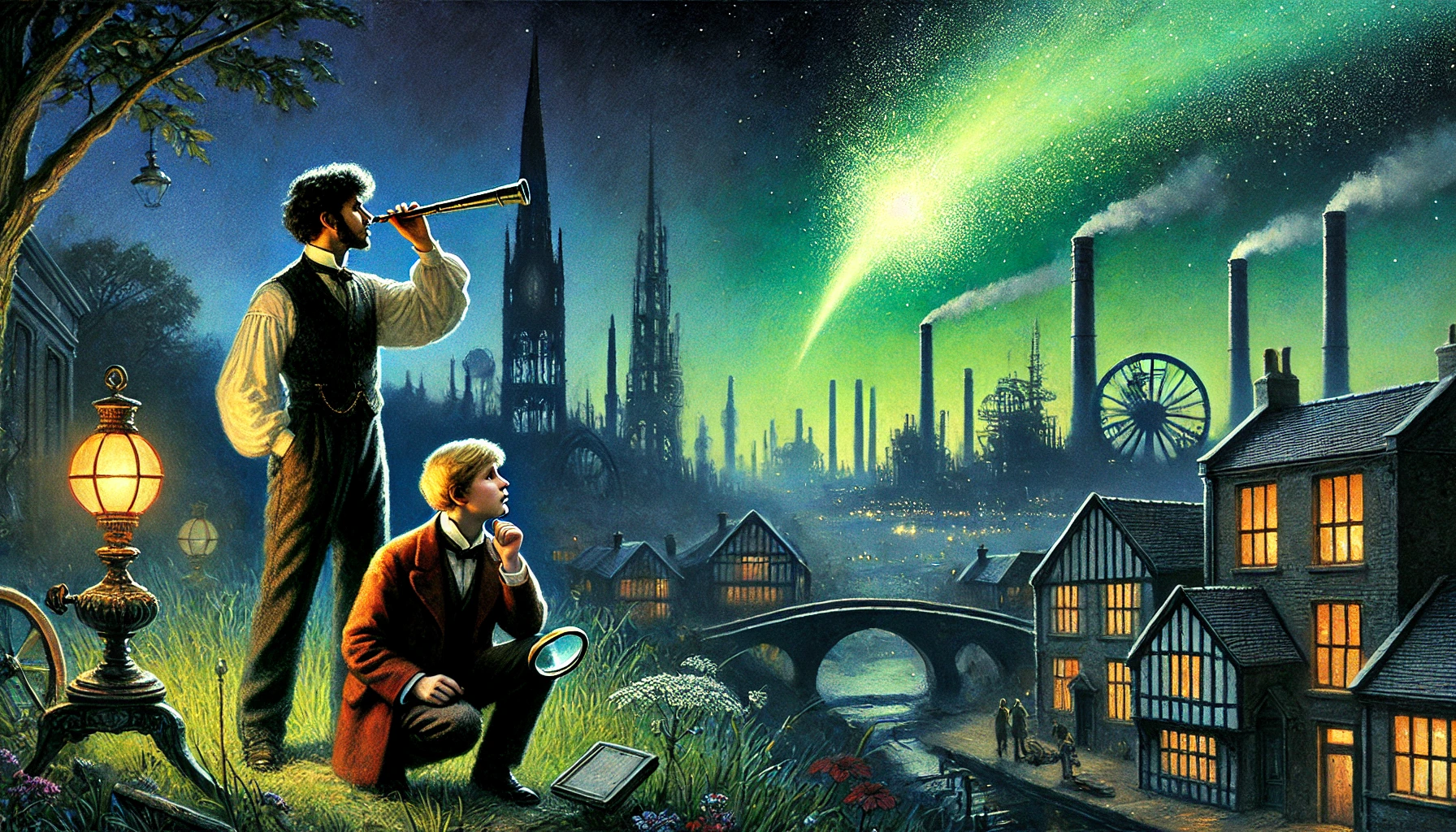“De Profundis” is a poignant and reflective work written by Oscar Wilde during his imprisonment in Reading Gaol between January and March of 1897. The text is a lengthy letter addressed to his former lover, Lord Alfred Douglas, who Wilde felt had greatly contributed to his downfall. The letter delves into Wilde’s thoughts on his own life, his relationship with Douglas, and his reflections on suffering, spirituality, and redemption. “De Profundis” offers an intimate glimpse into the mind of Wilde during a period of intense personal turmoil and transformation.
Plot Summary
Oscar Wilde begins his letter with a somber reflection on his tumultuous relationship with Lord Alfred Douglas. Wilde recalls how he was captivated by Douglas’s charm and wit, leading to an intense and all-consuming companionship. Their relationship, however, was marked by volatility and excess. Wilde, already a renowned figure in literary and social circles, found himself drawn deeper into a lifestyle of luxury and indulgence, largely influenced by Douglas’s insatiable desires.
As Wilde and Douglas continued their extravagant escapades, they attracted increasing scrutiny from society. The public and media grew fascinated with their flamboyant lifestyle, which ultimately drew the ire of Douglas’s father, the Marquess of Queensberry. The Marquess, disapproving of their relationship, initiated a series of confrontations and legal actions that would culminate in Wilde’s downfall. Despite warnings from friends and his own apprehensions, Wilde decided to sue the Marquess for libel, a decision that backfired spectacularly when evidence of Wilde’s own indiscretions surfaced during the trial.
Wilde was arrested and convicted of “gross indecency,” resulting in a two-year sentence of hard labor. In prison, Wilde faced harsh conditions and relentless monotony. His days were governed by strict routines, and he was subjected to physical and emotional torment. This period of confinement and suffering forced Wilde into a deep introspection. He began to examine his life choices, his relationship with Douglas, and the consequences of his actions.
During these solitary moments, Wilde found solace in writing. His reflections turned inward as he grappled with feelings of betrayal, regret, and despair. He realized how profoundly his love for Douglas had blinded him to the destructive path they were on. Wilde’s musings are filled with a sense of sorrow for the loss of his former self, a self that was once celebrated and revered. He acknowledges his own complicity in his downfall, admitting that he allowed Douglas’s influence to overshadow his better judgment.
Amidst the gloom of his prison cell, Wilde’s thoughts turned to spirituality. He found a profound connection with the figure of Christ, whom he saw as the ultimate artist and individualist. Christ’s teachings on love, forgiveness, and suffering resonated deeply with Wilde, providing him with a framework to understand his own plight. Wilde admired Christ’s ability to embrace pain and transform it into something beautiful and meaningful. This newfound spiritual perspective became a source of strength and hope for Wilde, offering him a sense of redemption and purpose.
Wilde’s letter also serves as a direct address to Douglas. He expresses both criticism and compassion towards his former lover, imploring Douglas to recognize the impact of his actions and urging him to change. Wilde’s words are a blend of stern admonition and heartfelt forgiveness, reflecting his desire for Douglas to learn from their shared experiences. He hopes that his own suffering might serve as a lesson, encouraging Douglas to embrace a more thoughtful and compassionate way of life.
Throughout his letter, Wilde contemplates the nature of art and the role of the artist in society. He laments the separation from his creative work, viewing his imprisonment as a barrier to his artistic expression. However, he also sees this period as an opportunity for introspection and renewal. Wilde argues that true art emerges from suffering, and he believes that his experiences in prison will ultimately enrich his creative vision. He looks forward to the day when he can resume his artistic endeavors, hoping to create works that reflect his transformed understanding of life and pain.
As Wilde’s narrative unfolds, he reaches a point of acceptance and peace. He has come to terms with his past actions and the consequences they brought. Wilde views his suffering as a necessary step in his personal and spiritual journey. He expresses hope for the future, envisioning a life where he can rebuild and continue to contribute to the world of art and literature. Despite the hardships he endured, Wilde remains optimistic about the possibility of redemption and the power of love and humility to heal.
In his concluding thoughts, Wilde reflects on the broader implications of his experiences. He criticizes society for its shallow understanding of justice and punishment, arguing that true rehabilitation requires compassion and support. Wilde emphasizes the importance of not being ashamed of one’s suffering, advocating for a deeper, more empathetic approach to those who have faced hardship. He envisions a society that values the transformative power of suffering and embraces the potential for growth and renewal.
With a sense of resolve, Wilde looks forward to his release from prison. He anticipates reconnecting with the world, armed with a new perspective and a renewed sense of purpose. Wilde’s letter, rich with introspection and philosophical musings, serves as a testament to his enduring spirit and his belief in the redemptive power of love, art, and suffering.
Main Characters
- Oscar Wilde: The author and protagonist, Wilde is a brilliant writer and wit whose life is upended by scandal and imprisonment. Through his reflections, he evolves from a man consumed by vanity and pleasure to one who embraces suffering as a path to spiritual enlightenment.
- Lord Alfred Douglas: Wilde’s former lover, often referred to as Bosie, Douglas is depicted as a spoiled and reckless young man whose influence leads Wilde astray. Despite Wilde’s deep affection for him, Douglas’s actions are portrayed as selfish and damaging.
Theme
- Suffering and Redemption: Wilde’s imprisonment becomes a journey of self-discovery and redemption. He explores how suffering can lead to personal growth and a deeper understanding of oneself and the world.
- Love and Forgiveness: Central to Wilde’s reflections is the theme of love, both its transformative power and its capacity to cause pain. Wilde grapples with the idea of forgiving Douglas and himself, finding strength in the concept of unconditional love.
- Art and Individualism: Wilde emphasizes the role of the artist as an individualist who finds beauty and meaning in both joy and suffering. He sees his own experiences as integral to his artistic expression.
- Spirituality and Christ: Wilde’s reflections on Christ reveal his unique interpretation of Christianity. He views Christ as an artist and individualist, whose teachings on love and forgiveness resonate deeply with Wilde’s own experiences.
Writing Style and Tone
Oscar Wilde’s writing in “De Profundis” is marked by its eloquence and introspection. The tone is deeply reflective, often melancholic, as Wilde confronts his past mistakes and the harsh realities of his present situation. His language is rich and poetic, filled with classical references and literary allusions that showcase his erudition and wit.
Wilde’s style in “De Profundis” combines personal confession with philosophical musings, creating a narrative that is both intimate and universal. His ability to articulate profound thoughts on suffering, love, and art in a deeply personal context makes the letter a powerful and moving piece of literature. The work stands as a testament to Wilde’s enduring genius, even in the face of immense personal hardship.
We hope this summary has sparked your interest and would appreciate you following Celsius 233 on social media:
There’s a treasure trove of other fascinating book summaries waiting for you. Check out our collection of stories that inspire, thrill, and provoke thought, just like this one by checking out the Book Shelf or the Library
Remember, while our summaries capture the essence, they can never replace the full experience of reading the book. If this summary intrigued you, consider diving into the complete story – buy the book and immerse yourself in the author’s original work.
If you want to request a book summary, click here.
When Saurabh is not working/watching football/reading books/traveling, you can reach him via Twitter/X, LinkedIn, or Threads
Restart reading!








